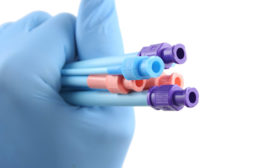Adhesives and Sealants Topics
New Acrylic Block Elastomer for Adhesive Applications
Developed using proprietary living anionic polymerization technology, a new acrylic thermoplastic elastomer is suitable as an adhesive for masking tape, packaging, surface protection film, double-sided tape, and as an anti-slip film.
October 25, 2023
Making Solid Connections with Swelling Fluids
Engineered silicone swelling fluid offers a safe and effective option for attaching silicone tubing.
October 25, 2023
AI Algorithm Is Accelerating Polymer Research
A new tool developed by scientists at Georgia Tech captures patterns and relationships and learns the grammar and syntax that occur at the atomic and higher levels in polymer structures.
October 24, 2023
Keep the info flowing with our eNewsletters!
Get the latest industry updates tailored your way.
JOIN TODAY!Copyright ©2025. All Rights Reserved BNP Media.
Design, CMS, Hosting & Web Development :: ePublishing









